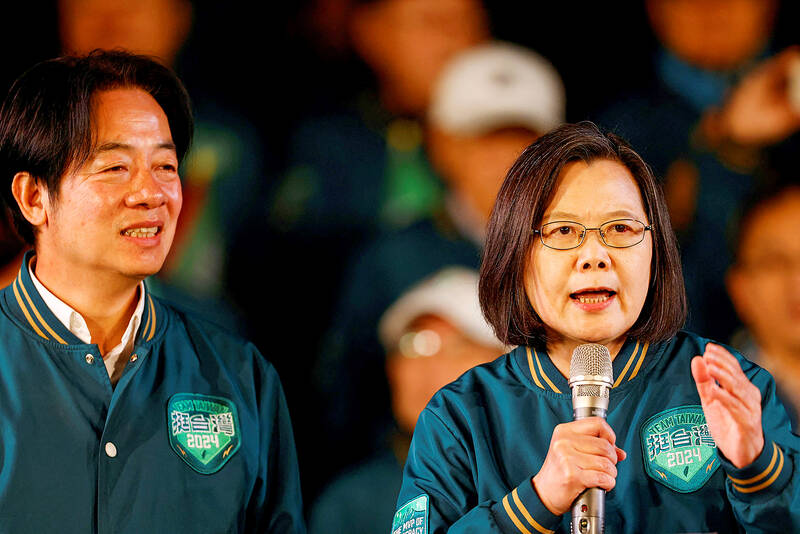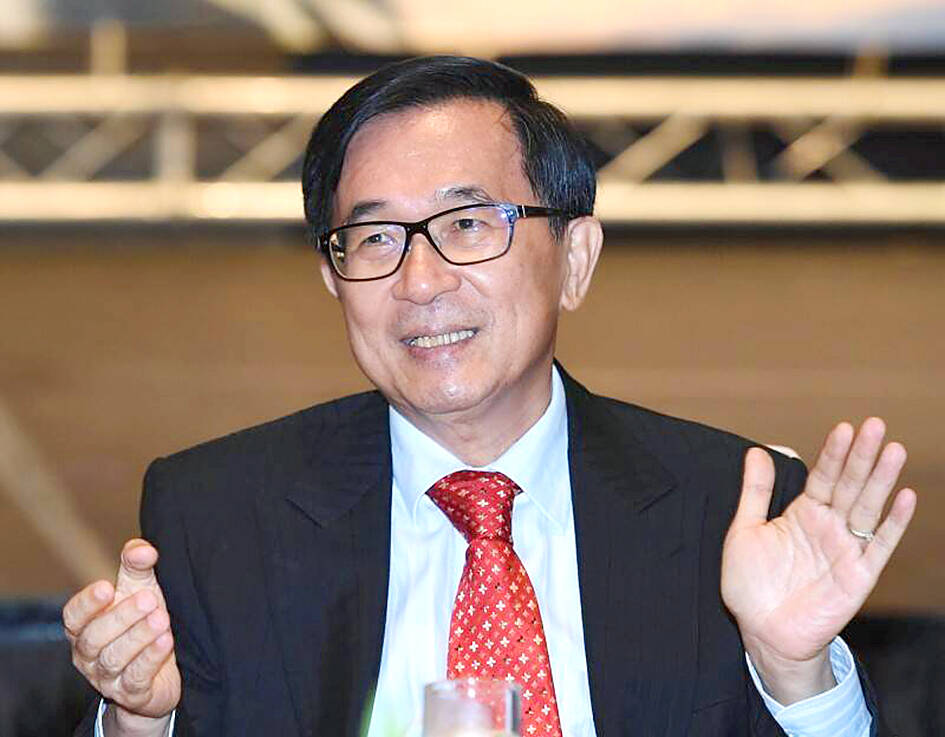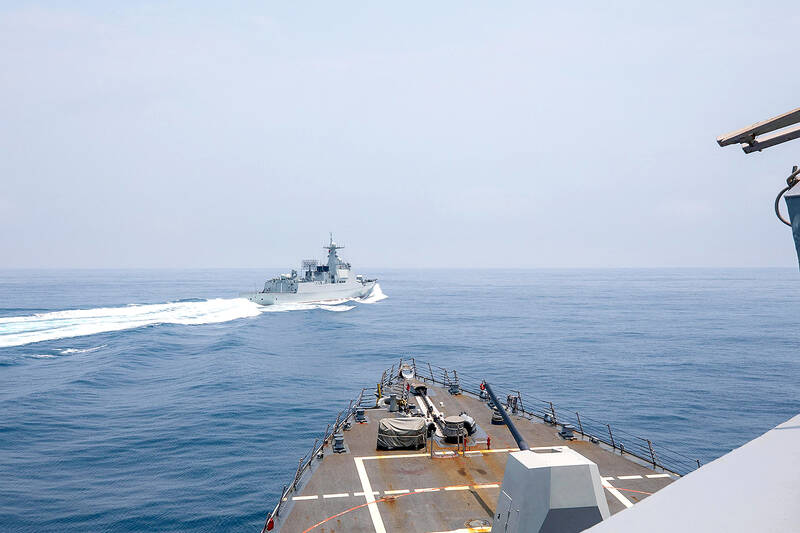Last week Joseph Nye, the well-known China scholar, wrote on the Australian Strategic Policy Institute’s website about how war over Taiwan might be averted. He noted that years ago he was on a team that met with then-president Chen Shui-bian (陳水扁)*, “whose previous ‘unofficial’ visit to the US had caused a crisis in which China fired missiles into the sea and the US deployed carriers off the coast of Taiwan.” Yes, that’s right, mighty Chen caused that crisis all by himself. Neither the US nor the People’s Republic of China (PRC) exercised any agency.
Nye then nostalgically invoked the comical specter of “Mad Chen” rattling his independence chains in the darkness, a phantom entirely invented by western commentators: “We warned Chen that if he declared independence, he could not count on American support.” That warning must have sounded hilariously, and arrogantly out of touch to Chen, whose ascendancy to the presidency had triggered military coup rumors, whose legislature was controlled by the Chinese Nationalist Party (KMT), whose first premier was from the KMT, presiding over a society in which almost every major institution was KMT-controlled. Boy, they sure told him!
THE ‘INDEPENDENCE’ MISNOMER

Photo: Reuters
In Chen’s day there was no possibility of “declaring independence” and there is none today. It was not possible while the US supported the murderous KMT regime on Taiwan. After martial law and the national security laws were lifted and the nation democratized, it did not become a possibility, because every Taiwanese knows what is at stake. In the PRC-Taiwan relationship, the madly irrational types who want to plunge the region into war are in Beijing, not Taipei.
When invoking the magic of de jure independence commentators almost never define what it might mean, in part because it is a component of the general Taiwan catechism that includes words like “one China,” “Taiwan Relations Act” and similar.
De jure with respect to what law? Under international law Taiwan is not part of any other state. The Republic of China (ROC) administrates Taiwan but does not own it. According to the ruling Democratic Progressive Party (DPP), Taiwan is already de jure independent as the Republic of China (ROC).

Photo: Taipei Times
In Chen Shui-bian’s halcyon days “independence” meant freedom from KMT rule and de jure independence meant the formation of an independent republic. This generation in Taiwan is a post-independence generation that seeks not a formal declaration but recognition from the international community. The DPP has embraced the ROC and hollowed out its symbols, subsuming them into the idea of Taiwan. That position is not likely to generate a declaration of independence, which is why there are a few die-hards out there, adhering to the old idea of independence, who are angry at President Tsai Ing-wen’s (蔡英文) sensible and moderate policies.
Still, commentators insist on juxtaposing the prospect of a PRC invasion of Taiwan, with its millions dead and injured, the global economy wrecked and the island of Taiwan shattered, perhaps occupied, with the prospect of a Taiwan “declaration of independence.”
FALSE EQUIVALENCIES

Photo: Reuters
Why is this done? There are several reasons. It gives speakers the appearance of balance — first they shake a finger at the PRC, and then they do the same to Taiwan. By creating this false equivalence, the US can appear evenhanded between Taipei and Beijing.
Because it makes both Taipei and Beijing appear equally crazed, it makes the people who use this dichotomy automatically appear rational, and enables the US to act as if it were the adult in the room.
The truth is that the PRC has already suppressed any declaration of de jure independence because it has promised to maim and kill Taiwanese if they attempt to live in a free, democratic and independent state. The PRC enforces this lack of a “declaration,” other countries need not worry that Taipei will suddenly “declare independence.” Why would it do that, when the DPP affirms every day that Taiwan as ROC is already independent — a clever rhetorical move that keeps the I-word in front of everyone. Kudos to the DPP for that!
Everyone at the top in Taiwan is quite intelligent and aware of the situation. In fact, judging from current president’s sensible policies, and the moderate promises of her successor William Lai (賴清德), the people running the nation’s foreign policy are leaps and bounds ahead of the last four or five US administrations, who seemed to believe the US can deter the PRC while completely lacking manufacturing industries, shipyards and logistics support vessels.
Another reason for the binary of PRC invasion-Taiwan independence declaration is that it is a pro-PRC move. It legitimates PRC violence by shifting the blame for it onto the Taiwanese. After all, if Taiwan didn’t have the potential for independence, the PRC wouldn’t have to be violent, right? Poor, put upon PRC.
Any formulation of things that removes PRC responsibility for violence is a pro-PRC formulation.
Nye ends with the nostalgia trip back to the arrangements of a bygone era. To stop the onrush of war, Nye says that the US must “show China that the US and its allies have the capacity to defend Taiwan,” and, of course, remind Taiwan’s leaders “that a de jure declaration of independence would be provocative and is unacceptable.”
This recipe for peace “worked” because the US enforced the peace with lots of big powerful ships. For the past 70 years, the US has had overwhelming power. This reveals another function of the “Taiwan mustn’t declare independence” half of the binary: it hides the role of US war power in keeping the peace. Instead, it attributes peace to deft US diplomacy rather than naked force. US diplomacy was only taken seriously because the US had more planes and ships than the PRC, and those war craft were better. In a world where the US had a navy like France or Australia, the PRC would have laughed at US diplomats.
The problem with attributing peace to deft diplomacy rather than emphasizing the war making capacity is that it makes it tempting to address PRC expansion via diplomacy.
We are much too late for that.
* Editor's note: The original version of Joseph Nye's article on the Australian Strategic Policy Institute's (ASPI) Web site and quoted in this story, cited a meeting between Chen Shui-bian and a group of former US officials that included Nye. However, Nye's delegation never met with Chen Shui-bian, but in fact met with Lee Teng-hui, an omission that ASPI has changed on its Web site. The Taipei Times regrets any confusion.
Notes from Central Taiwan is a column written by long-term resident Michael Turton, who provides incisive commentary informed by three decades of living in and writing about his adoptive country. The views expressed here are his own.

Growing up in a rural, religious community in western Canada, Kyle McCarthy loved hockey, but once he came out at 19, he quit, convinced being openly gay and an active player was untenable. So the 32-year-old says he is “very surprised” by the runaway success of Heated Rivalry, a Canadian-made series about the romance between two closeted gay players in a sport that has historically made gay men feel unwelcome. Ben Baby, the 43-year-old commissioner of the Toronto Gay Hockey Association (TGHA), calls the success of the show — which has catapulted its young lead actors to stardom -- “shocking,” and says

The 2018 nine-in-one local elections were a wild ride that no one saw coming. Entering that year, the Chinese Nationalist Party (KMT) was demoralized and in disarray — and fearing an existential crisis. By the end of the year, the party was riding high and swept most of the country in a landslide, including toppling the Democratic Progressive Party (DPP) in their Kaohsiung stronghold. Could something like that happen again on the DPP side in this year’s nine-in-one elections? The short answer is not exactly; the conditions were very specific. However, it does illustrate how swiftly every assumption early in an

Inside an ordinary-looking townhouse on a narrow road in central Kaohsiung, Tsai A-li (蔡阿李) raised her three children alone for 15 years. As far as the children knew, their father was away working in the US. They were kept in the dark for as long as possible by their mother, for the truth was perhaps too sad and unjust for their young minds to bear. The family home of White Terror victim Ko Chi-hua (柯旗化) is now open to the public. Admission is free and it is just a short walk from the Kaohsiung train station. Walk two blocks south along Jhongshan

Francis William White, an Englishman who late in the 1860s served as Commissioner of the Imperial Customs Service in Tainan, published the tale of a jaunt he took one winter in 1868: A visit to the interior of south Formosa (1870). White’s journey took him into the mountains, where he mused on the difficult terrain and the ease with which his little group could be ambushed in the crags and dense vegetation. At one point he stays at the house of a local near a stream on the border of indigenous territory: “Their matchlocks, which were kept in excellent order,